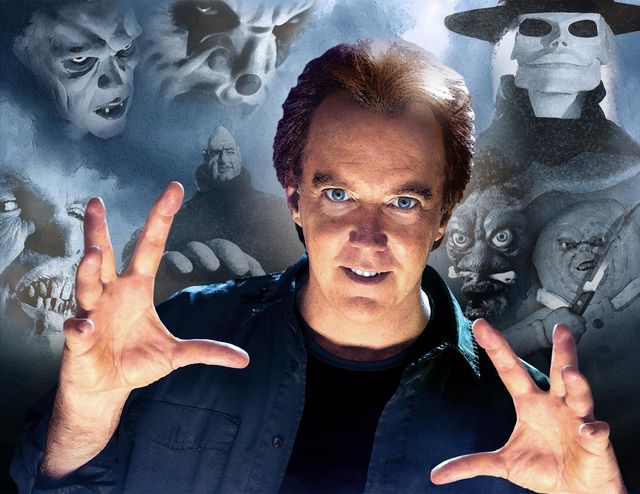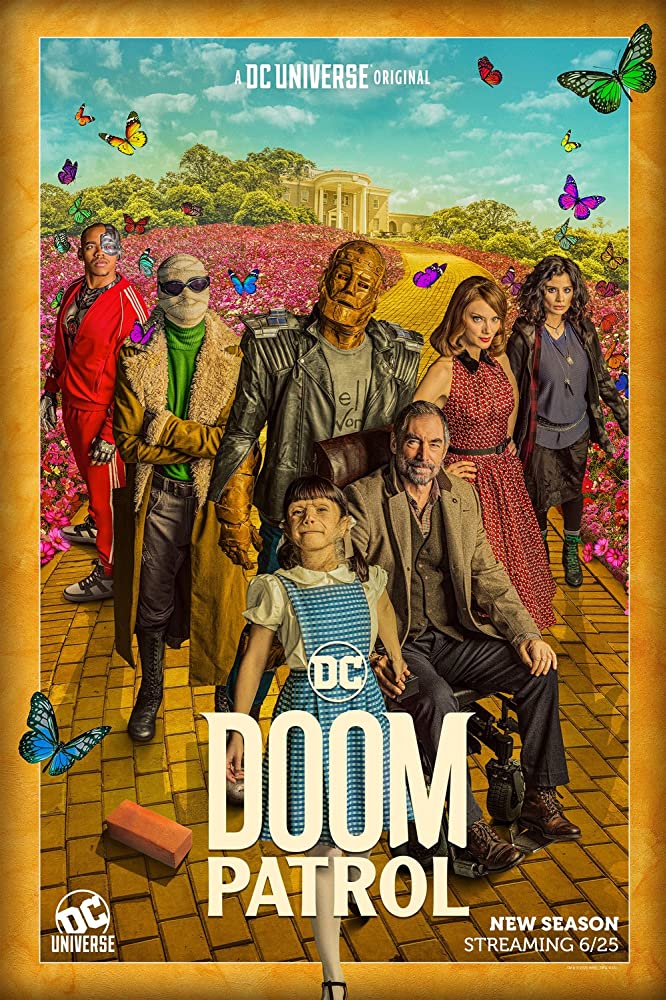To a certain percentage of the population—those who grew up in the dawning Home Video Age of the ’80s—the name Full Moon Entertainment still holds a certain nostalgic resonance. Founded by writer/director/producer Charles Band after the collapse of his small-scale theatrical studio Empire Pictures, Full Moon was created with the sole purpose of stocking America’s burgeoning video stores with slick-looking, low-budget horror, sci-fi and fantasy films. Thanks to popular series like Subspecies (four films), Trancers (six films) and Puppet Master (nine films) and successful one-offs like Meridian, Robot Jox and Oblivion , Full Moon was a staple of the direct-to-video realm for decades.Now, after years of weathering bankruptcy, various lawsuits and the death of the VHS tape, Band is back. In late 2003, Band began work on his first 35mm film in years, Dr. Moreau’s House of Pain . The film, released in January 2004, marked the official return of Full Moon Features (as it’s now called). Band has even launched a handful of new, direct-to-DVD series like The Gingerdead Man (starring Gary Busey as a murderer reanimated as a killer cookie) and Evil Bong (about a, well, you probably get the idea). Band will be breezing through Albuquerque this weekend with the latest edition of his Full Moon Horror Road Show. In 2005, Band launched the Road Show— an annual, traveling, Full Moon-inspired stage show packed with nostalgic film clips, guest stars, live effects demonstrations, autograph signings, scantily clad women and buckets of fake blood—as a way to “spread the word.” Unable to spend the millions of dollars that major film studios do on promoting their products, Band had to find an innovative way of connecting with old fans and new audiences interested in his particular brand of B-movie madness. “I am lucky enough to have [had] fans for so many years,” says the newly invigorated Band. “The hardcore fans find the movies, but a lot of people who enjoyed my movies 10, 15 years ago got busy, got older, got professional, got family and they just kind of lost track of how to find the website and the places where these movies can be rented.” The movie industry has changed a great deal since Full Moon’s heyday in the mid-’90s. The VHS tape has given way to the DVD, which is giving way to Blu-Ray. Videos stores are increasingly rare in this digital-only era of Internet downloads and video-on-demand. “There was a time when we had about 2,000 video stores where there were actually Full Moon sections,” recalls Band. “People knew where to find them, where to look. Then all those stores pretty much closed, because [the industry] became Blockbuster and Hollywood and all these big chains. A lot of the ma-and-pa video stores that were big champions of my films went away. So any kind of library or anything beyond the most current releases became impossible to find. A lot of people lost track and thought Full Moon must be out of business.” Inspired by touring rock and roll shows, Band trucks his annual Full Moon Horror Road Show to nearly 100 cities a year now. He prefers to perform in “small, edgy bars” rather than movie theaters, because “the more people drink and relax, the better the show gets.” Band promises “a combination of clips, stories and funny stuff.” Just don’t go expecting a passive experience. “More and more I learn that the audience is crazier than I thought,” says Band, currently on his fifth Road Show tour. “What they enjoy most is the interactive stuff I invented: contests, bringing people up on stage, doing a poor man’s ‘American Idol,’ making short improv scenes from horror movies that I direct. People get killed, heads get chopped off, girls eventually—for almost no reason at all—take their tops off. It all just adds to this Grand Guignol of silliness.”Another reason for the Road Show’s rowdy movies-meet-booze atmosphere may have to do with the way in which Full Moon films became popular in the first place. By avoiding movie theaters and sticking exclusively to easily exploitable, boob-and-blood-filled genre outings, Full Moon films developed into regular party fixtures back in the day. Consuming Kraa! The Sea Monster, Castle Freak or Shrunken Heads alongside a rowdy group of like-minded Full Moon lovers was a Saturday night rite of passage for many a high school (or college) student. “I’ve met or seen 40, 50 people with tattoos of my characters on their bodies,” says Band. “That’s kind of a sobering thing.” Over the years, Full Moon managed to build a rabid fan base thanks to its frequent sequels ( Femalien 2: The Search for Kara ) and occasional movie character crossovers ( Dollman vs. Demonic Toys ). The inspiration for this “give the fans what they want” universe came from an unusual place. Band spent his formative years in Rome, Italy, “away from TV and everything that people grew up with here.” The prolific filmmaker’s father, Albert Band, moved there in the early ’60s to write, produce and direct gladiator flicks like Hercules vs. The Sea Monster and spaghetti Westerns like Massacre at Grand Canyon . One of young Mr. Band’s few connections with his native America was imported comic books. It was those comics—specifically publisher Stan Lee’s groundbreaking Marvel Comics line—that most inspired the future filmmaker. “I had a real steady, heavy diet of comics. Mainly Marvel Comics,” recalls Band. “There was a while where I was saying hopefully this is the beginning of a Full Moon universe, like the Marvel Comics universe of the ’90s.” One of the things that inspired the most brand loyalty among longtime Full Moon fans was the popular “VideoZone” feature included on many Full Moon videotapes. The behind-the-camera newsmagazine featured trailers, merchandise, filmmaker profiles and making-of documentaries. This innovative feature (launched years before such “extras” became standard on DVDs) was inspired by the “Stan’s Soapbox” column published each month in assorted Marvel Comics. “You heard a little about what went on at Marvel. It was so exciting,” says Band, still tingling over tidbits about favorite artists like Jack Kirby and Steve Ditko. “I thought, lemme see if I can bring a little bit of that into the Full Moon experience. … My plan was always to build up these separate franchises and begin to cross the characters over. Use the early Marvel Comics as a model both in front of the camera and behind the scenes.”Band admits that his new Full Moon films face an uphill battle in today’s marketplace. “As exciting as it is to have 40 movies on iTunes, all the revenue from all 40 movies in a month don’t equal 10 percent of what we would get from one movie in the ’80s.” Still, Band is happy to be back in the swing of things. “For the first time in years, we’ve got six movies back-to-back. And five of them are sequels of our more successful franchises. We finished Puppet Master in China and Demonic Toys in Italy and Killjoy 3 in China. We’re gonna be doing, finally, a new Trancers movie. I’m excited to work with Tim Thomerson again.”Even if Full Moon can’t quite match the heights of its glory days, Band is proud of the legacy he’s created. “I just wanted to make Full Moon something that people appreciated. I really wanted to let viewers and retailers know that they were getting a certain quality and a hopefully well-told—albeit low-budget—tale. And [to know] that they could rely on the label. They knew we wouldn’t be sending down some weird clunker. I mean, not every movie turned out great; but they all had a certain spirit and style that I still hear about today. So we must have done a little something right.”
The Full Moon Horror Road Show 2009Launchpad (618 Central SW)Sunday, Oct. 4, 8 p.m. $10 tickets a the door, $8 advanced tickets at Burning Paradise Video (800 Central SW)Burning Paradise Video is running a contest in conjunction with Full Moon. Sign up at Burning Paradise and you could win a role as a murder victim in Gingerdead Man 3: Saturday Night Cleaver . The winner will be announced at Sunday’s Road Show.As a warm-up to the Road Show, Alibi Midnight Movie Madness will sponsor a screening of 1985’s original Trancers at Guild Cinema on Friday and Saturday, Oct. 2 and 3, beginning at 11 p.m. Tickets are $5. Advanced tickets for Sunday’s Full Moon Horror Road Show will also be on sale for the discounted price in the Guild lobby.




